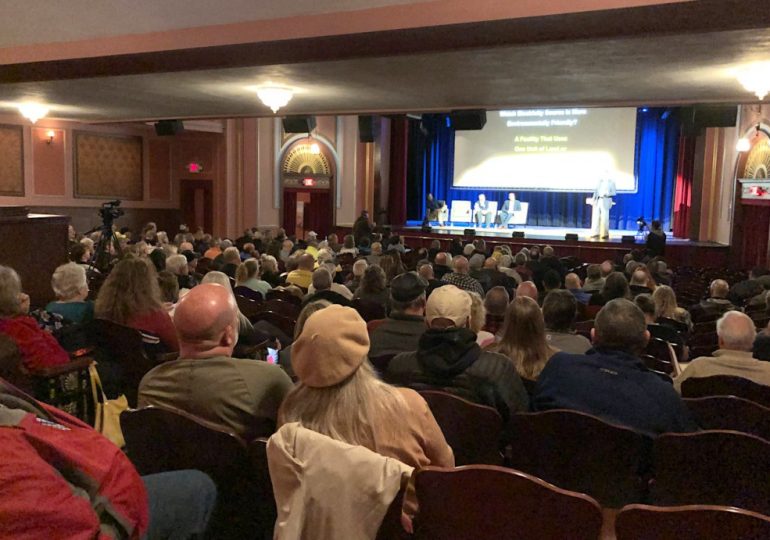The leader of a local anti-solar energy group admitted to Ohio regulators last week that a well-connected natural gas executive is among the group’s largest donors.
The testimony by Jared Yost, founder of Knox Smart Development, offered the fullest view yet of the group’s ties to fossil fuel interests, undercutting its claims to be a “grassroots” advocate for local farmers and other residents.
“It changes the story quite a bit,” said David Pomerantz, executive director of the Energy and Policy Institute, a watchdog group that recently published a report on the fossil fuel industry’s long history of using money and misinformation to stoke local opposition to renewable energy projects.
Knox Smart Development emerged late last year as a high-profile local opponent of the proposed 120 megawatt Frasier Solar project, located near Mount Vernon, Ohio. Questions emerged about its funding source after it hosted a town hall meeting at a local theater with complimentary food and drinks for approximately 500 attendees.
Yost disclosed during an Ohio Power Siting Board hearing last week that one of its largest donors is Tom Rastin, the former vice president of Ariel Corporation, which makes compressors for the oil and gas industry. The Washington Post reported last year that Rastin is also a leader of The Empowerment Alliance, a dark money nonprofit that advocates for the natural gas industry.
Yost said he did not have knowledge about Rastin’s work with The Empowerment Alliance, but said the fossil fuel group provided “non-financial” resources to Knox Smart Development to help oppose the Frasier Solar project.
Yost denied being swayed by corporate interests and said his group has not received corporate funding. “The Empowerment Alliance has nothing to do with me or [Knox Smart Development],” he told the Energy News Network via email. “I have reached out to them and asked questions on a couple of occasions, as can anyone, and as I have done of others.”
Multiple links
When asked in his hearing testimony if Knox Smart Development was “funded by any individuals or entities having any interest or providing any goods or services to the fossil fuel industry,” Yost answered, “No, not directly to the best of my knowledge.”
On cross-examination, however, Yost admitted Rastin was one of the group’s largest funders. Yost is a former IT specialist at Ariel Corporation, and his work supported Rastin’s department. Rastin’s wife, Karen Buchwald Wright, is a former president and CEO of Ariel and continues as board chair. Her son Alex Wright succeeded her in 2021 as CEO.
A July 2024 report from the Energy and Policy Institute includes links to recently produced public records. A September 2023 email shows Rastin was slated to speak to the Ohio General Assembly’s Business First caucus in October. The email attached a copy of Rastin’s biography with The Empowerment Alliance logo on top.
Mitch Given, who was identified in a meeting with Ohio lawmakers last year as The Empowerment Alliance’s Ohio director, spoke at a Knox Smart Development town hall meeting last November. There he was introduced as someone who travels across the state to help farmers and others “find their voice” and push back against solar projects.
The emcee for that town hall event, Tom Whatman, is a chief strategist for Majority Strategies. The Empowerment Alliance’s Form 990 filing for 2023 shows it paid the political consulting firm more than $620,000 that year, making it the group’s highest paid contractor for five years in a row.
Yost last week also discussed a dinner meeting last summer about the Frasier Solar project where the attendees included Rastin, Given, Whatman, Ariel employee Trina Trainor, and Lanny Spaulding. Spaulding is listed as a contact person for The Empowerment Alliance on an Ohio lobbyist registration form. Yost’s dad and others also attended. Yost had earlier said he did not organize the meeting.
Yost denied being influenced by The Empowerment Alliance or other corporate interests.
“No one has ever tried to direct me in any way with my opposition to this project. I am nobody’s ‘puppet’,” Yost told the Energy News Network. “I am doing this for me, my family, my township, and my neighbors.” He also said it was “insulting that people try to question my intentions, integrity, and intelligence. Frankly, it hurts.”
Misinformation at work
Nolan Rutschilling, managing director of energy policy for the Ohio Environmental Council, said arguments presented by behind-the-scenes special interests can be more believable if they seem to come from a grassroots effort.
“People trust their neighbors because they are often believed to not have any outside agenda other than the best interest of their community,” Rutschilling said. “Unfortunately, this allows misinformation to spread quickly, and communities have stopped renewable energy projects from moving forward.”
The stakes are significant, he said, because local public sentiment is among the factors the Ohio Power Siting Board considers in judging whether a project is in the public interest, along with statewide interests.
“If the fossil fuel industry wants to oppose solar projects, they should intervene in the open — not by amplifying misinformation in communities,” Rutschilling said.
“The Empowerment Alliance prefers to stoke fear in hopes of snuffing out perceived competition from clean, cheap, local renewable energy,” said Craig Adair, a vice president for Frasier Solar’s developer, Open Road Renewables. “As always, Frasier Solar stands ready and willing to address local residents’ legitimate concerns about potential impacts of solar development.”
Statements at Knox Smart Development meetings and in ads have included multiple examples of misinformation. For example, Yost admitted during cross-examination he was unaware that a photo showing damaged solar panels was taken in St. Croix after a strong hurricane — a highly unlikely event in central Ohio.
“This was intended to show what I believe could happen,” Yost said.
Other examples include unsupported claims about solar panels and other components releasing toxic chemicals. Steve Goreham, a speaker at the group’s November 2023 town hall, made unsupported claims about climate change. Goreham also drew spurious correlations between electricity price rises and high levels of renewable energy in California and Texas. In fact, wildfires, extreme heat and transmission upgrades were the driving factors.
Misinformation was rife in opposition testimony people gave at three local public hearings held by the Ohio Power Siting Board in Knox County.
Half of more than 100 unique arguments made by project opponents at those hearings were not supported by the facts, said Heidi Gorovitz Robertson, a professor at Cleveland State University College of Law, in her August 22 expert testimony for the Ohio Environmental Council.
“In the aggregate, the arguments do not present credible or compelling opposition to the proposed project,” Robertson said.
Connections confirmed between ‘grassroots’ Ohio solar opposition and dark-money natural gas group is an article from Energy News Network, a nonprofit news service covering the clean energy transition. If you would like to support us please make a donation.
Leave a comment




